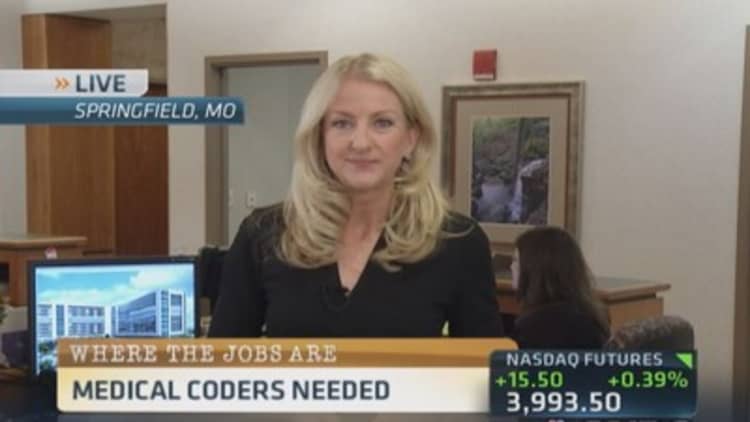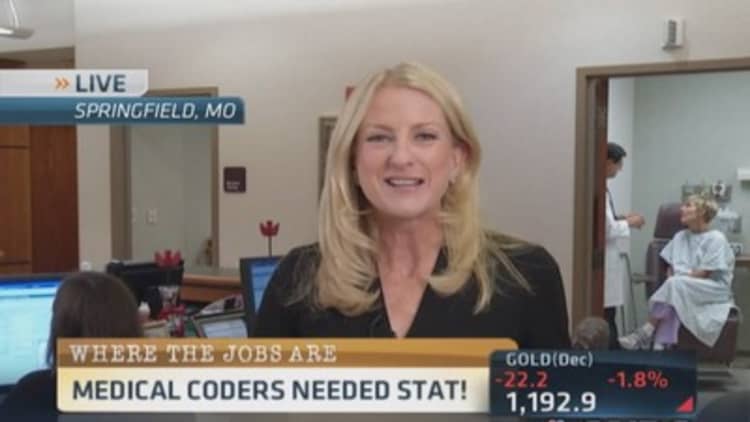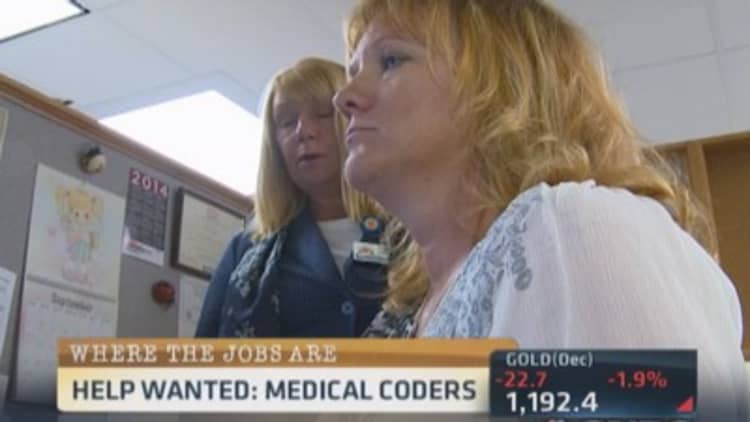


Dealing with emergencies is nothing new to the heath care industry, and while not life threatening, a lack of skilled medical coders threatens to disrupt one of the critical elements a hospital needs to stay up and running—insurance payments.
"Right now there is a dramatic shortage of skilled workers in the market so we have an opportunity to help a lot of our clients," said Torrey Barnhouse, president of TrustHCS.
The shortage is being driven primarily by the coming adoption of a new federally mandated coding standard. To help meet its clients' demands, Barnhouse said TrustHCS, a Springfield, Missouri-based health information services provider, plans to double its medical coding workforce over the next 12 to 18 months. The additional 300 coders it is looking to recruit, train and supervise will then be contracted out to do work for hospitals and doctors' offices.
A coder's job is critical for two reasons. First, they translate all the details of a patients record into codes used by insurance companies to determine how much they reimburse a doctor's office or hospital.
Second, the codes, which adhere to an international standard, can be analyzed by health care providers to determine how effectively, or not, a certain ailment is being treated by a single doctor, or a hospital in the U.S. or around the world.
"We look for particular treatment protocols and outcomes related to those episodes of care," said Barnhouse. "So the accuracy of data collected by coders is centrally important to that."
Barnhouse said there is a constant 20 to 30 percent shortage of medical coders, a deficit seen growing to 50 percent in the coming year because of a new coding standard scheduled to be adopted by October of 2015. Known as ICD-10, the new standard aims to provide more details on the diagnoses, treatments and outcomes a coder records from a doctor's notes, procedure recommendations and patients lab results. ICD-10 uses more than 140,000 codes, including a new designation for the Ebola virus, compared to the just over 17,000 codes employed by the current standard ICD-9.
Because it is so much more detailed, the adoption of ICD-10 is expected to decrease a coder's productivity by 50 percent. In order to make sure billing and payments do not fall behind, many hospitals began preparing to hire more coders to make up for the expected loss in productivity a few years ago.
Read MoreMaritime boom: More hands needed on deck
At Boston's Beth Israel Deaconess Medical Center, director of workforce development Joanne Pokaski said the hospital began outlining its plans for the transition in 2013. Since then it has implemented two steps to insure it has enough experienced coders by 2015.
"We worked with programs in the community to train coders and created a paid internship" said Pokaski. "Then we took employees that were in-house and trained them from scratch on coding."
Becoming an accredited coder requires anywhere from 700 to 1,000 hours of coursework in fields of study including physiology, anatomy and pharmacology. The courses can be done online, but the problem for many hospitals is they do not want someone with an accreditation, they want people with accreditation and experience. This means in some areas, there is a bidding war going on for coders.
"We're putting in a retention bonus for our current staff, started paying retention bonuses," said David Strong, vice president of hospital revenue cycle for CoxHealth, a Springfield, Missouri- based firm, which operates five hospitals in Missouri and Arkansas.
Strong said the bonuses will be paid quarterly and will be 10 percent to 25 percent of a coder's annual salary, depending on their experience. The average coders salary at CoxHealth, $30,000 to $35,000 according to Strong.
Barnhouse, whose firm works with hospitals across the country, said a coder's salary will increase with the amount of experience they have, but typically ranges from $30,000 to $60,000. He said a coder who has only worked in a doctor's office may earn less than one who has worked in a hospital coding records from areas ranging from pediatrics to orthopedics to oncology.
The experienced coders can increase their earnings potential by becoming peer reviewers, then supervisors, then auditors, said Barnhouse. Some he said, go on to become consultants and pull down six figure salaries.
The potential for advancement is one reason that 37-year-old Jill Tracy joined TrustHCS's training program.
"I took a pay cut, but with coding the ceiling is higher," said Tracy.
Tracy, a tall, slim brunette who worked as a radiation technologist for 13 years, has set a long term goal of becoming a coding trainer with TrustHCS. For now though, she is apprenticing with an experienced coder, having finished her coursework.
Read MoreThis firm helps others by growing its own workforce
Along with greater earnings potential, medical coding gives the mother of two something she didn't have before, flexibility.
"I get up and get my kids off to school and I grab a cup of coffee," said Tracy, who lives in Springfield. "I sit at my desk and I code from home all day."
Tracy's situation is not unusual in the world of medical coders. TrustHCS said all of it coders work remotely and many of those who are employed directly by hospitals do the same, given all the needed records can be retrieved electronically. And though coding can be done at home, coders do not stay still. It is a job that requires constant retraining.
Read MoreRead More Julie Davison, a coder at Kalispell Regional Medical Center in Kalispell, Montana, has been a coder for 16 years. Every year she undergoes new training to keep her up to speed on advances in medicine.
Read MoreTraining workers for biotech labs is Mass. program'sgoal
"You have to be very detail oriented," she said. "And you also have to be able to adopt to change because the medical field is changing on a regular basis."
The coding field is changing too, presenting an opportunity for those looking for a career in health care.


